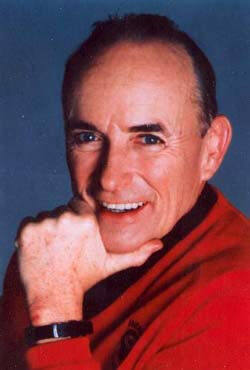 The first time I ever saw Andy Greeley’s name was on the cover of a book resting on my Irish-descended grandmother’s coffee table. It was not a work of sociology.
The first time I ever saw Andy Greeley’s name was on the cover of a book resting on my Irish-descended grandmother’s coffee table. It was not a work of sociology.
Two decades later, during graduate school at the University of Arizona, I encountered some of Andy’s sociological work, which Carol has nicely highlighted. I encountered Andy, too. (When I first mentioned meeting Andy to my mom, she smiled–Andy had been her graduation speaker at Mercy College some decades before. His influence spanned generations).
Despite his advanced years, and his “snowbird” identity of arriving in Arizona each year when the weather worked in his favor, Andy had a warm reputation inside the department. I occasionally heard rumors of weddings and baptisms he had done for students in past decades. This is no small thing, given that Andy’s sociology of religion had nearly as much verve aimed at the secularization theory of social scientists as that aimed at the tin-eared attitudes of Catholic bishops. I once saw Andy give a paper on Chicago’s ethnic tribes to our department’s weekly “brown bag,” a no-holds-barred forum for sociological work in progress. Andy was still on his game, and still held the audience’s interest, albeit using transparencies instead of the now-ubiquitous Powerpoint.
Through a bit of finagling, I was able to TA for an undergraduate class on “God and the Movies” that Andy taught with Albert Bergesen. Every week, sixty undergraduates watched a film (Babette’s Feast, All That Jazz, The Legend of Bagger Vance, etc.) and read a sociological interpretation in a book co-authored by Andy and Al. Then, during each week’s lecture session, Andy and Al re-enacted the sociological dimensions of the Protestant Reformation. Andy demonstrated his much-theorized analogical imagination, finding humanity and divinity in plots and characters that students least expected to see as “religious” or “good.” Al represented Max Weber’s “iron cage of rationality,” playfully pushing against Andy’s warm, pastoral conclusions. Andy spoke off the cuff, wove together a stream of stories, and came perilously close to giving a weekly homily at a public university. He read and graded all sixty papers submitted each week. I can assure you that the grades for a number of the students were the result of Andy’s collaboration with grace. As Andy himself often said, being a sociologist was a way for him of being a priest.
With Andy’s passing I wonder how his work and reputation will be received in the years to come. His novels, still for sale on Amazon, may age out as the Catholicism portrayed (and skewered) in their pages becomes a thing of the past. (My grandmother, I found out a few years ago, didn’t wait for the novels to age out: she began to find them too steamy in the mid-1980’s and put them aside).
Regarding the rest of his work, to American society Andy introduced Catholics, to Catholics he introduced sociology, and to sociologists he introduced religion.
Of those three “introductions,” the connection of sociology to the Catholic tradition may still be the most unfinished. (Why else write on this blog?) Sociological thinking is familiar to many educated Catholics now, including Catholic institutional leaders. But Andy’s success at using data to puncture Catholic myths and represent the unrepresented laity has had its downside. There is a continuing tendency to fall into a trap that sees sociology as data collection, that sees data collection as easy, and that mistakes a collection of indicators of Catholic life for understanding about the dynamism of Catholic life. Andy once commented to me (I paraphrase here) that whenever members of a parish or Catholic organization mentioned they were doing a survey, he told them to stop and hire a sociologist before finding out what they wanted to hear.
At a deeper level, I worry that exciting sociological developments have a slim profile in the training and thinking of Catholic leaders who may be most interested in sociology’s tools for narrow Catholic self-reflection. Sociological work on the dimensions of culture, roots of rising inequality, global solidarity, and sexuality could all inform work across a wide expanse of Catholic life. Of course, many of these themes might be controversial and require deep reflection. The example of doing such work, and being Catholic, is one of Andy’s most important legacies.
Well stated Gary. I did not know him personally, but much of his writing, I think, was in defense of the ordinary Catholic – the pew-dweller if you will – and I always found that honest and helpful. In my humble opinion, the message “you are not a good enough Catholic” is too prevelant today – and i think Fr. Greeley would agree.